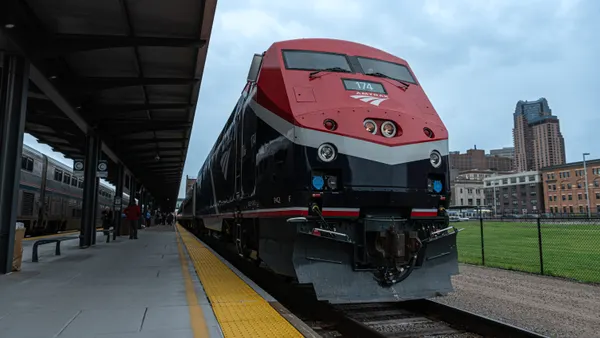Dive Brief:
- Women pay a mobility "pink tax" in cities, spurred by concerns around public transit safety that lead those riders to take alternative, more expensive modes of transportation, such as ride-hailing.
- During a gender and equity panel at the Smart Cities New York conference, panelists reflected on a "ride at your own risk" mentality that is plaguing women transit riders across the country. Sarah Kaufman, associate director of the NYU Rudin Center for Transportation, shared highlights from a November 2018 survey that found women pay up to $50 more per month to take alternative rides for safety reasons, and nearly 75% of the women in the survey reported being sexually harassed on the subway. "It is a pervasive problem," she said. "And it's not just New York, and it's not just on the subway."
- Panelists outlined approaches that New York and San Francisco are taking, including late-night bus service improvements that allow riders to get dropped off at non-designated spots they deem safe; research into improving carpooling offerings; and efforts to boost Mobility-as-a-Service (MaaS) systems so riders can seamlessly transfer from one mode of transportation to another without worrying about safety risks.
Dive Insight:
A recent report from the American Public Transportation Association (APTA) found public transit ridership is on the decline, and while agencies across the country are trying new efforts to encourage bus and rail use, ridership will remain a problem if safety concerns are not addressed in a proactive manner. Kaufman noted that the New York Metropolitan Transportation Authority (MTA) is fixing lighting in the city's subway, though she called that "a Band-Aid" on the issue.
"The first part of [moving toward more public transit use] is understanding the barriers of transportation, and women's security and safety on public transit is a huge component that's missing from the conversation. We're kind of condoning this acceptance and this reality that we're 'ride at your own risk,'" said Danielle Harris, innovation strategist for the San Francisco Municipal Transportation Agency (SFMTA). She reflected on the many ways women are "armoring up" on the subway, such as acting unfriendly or carrying keys or mace in their pockets.
The women were also joined on stage by Michael Replogle, deputy commissioner for policy at the New York City Department of Transportation (NYC DOT), who discussed the recently released OneNYC 2050 report aimed at "building a strong and fair city." Replogle said equity is at the heart of that vision, and these issues of safety and security are a top priority for the department.
"Gender needs to be one of the filters through which we view equity. Women indeed hold up half the world," said Replogle. "And as we look at our mobility systems ... women do face many higher barriers to access in mobility than do men because the design of our transportation systems and services has been carried out mostly by men on behalf of their perspective of what mobility problems are."
While it's evident from the panel that cities are a long way from solving equity issues around mobility systems, other panels at the conference highlighted the many ways women are helping cities advance, especially economically.
During a session entitled "The Future of Cities is Female," panelist Avantika Daing of Plum Alley Investments said startups that are founded or co-founded by women generate 10% more in cumulative revenue over a five-year period. These trends were echoed by fellow panelists who reinforced that giving women equal opportunities to run businesses can lead to more jobs and a more robust local economy.
"When we empower women in a variety of ways, we're empowering our ecosystems for everyone," said Dawn Barber, co-founder of NY Creative Tech Week.












